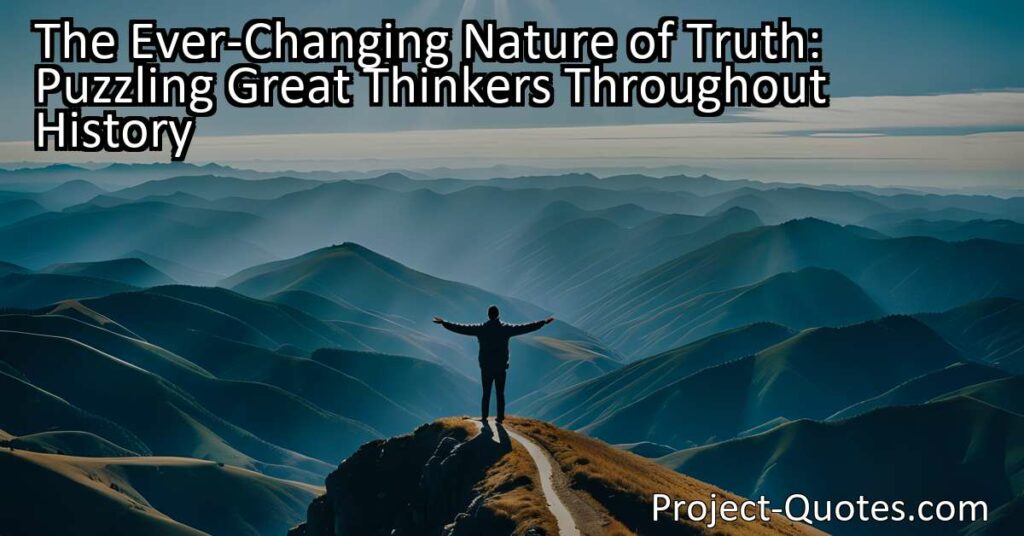Say not, ‘I have found the truth,’ but rather, ‘I have found a truth.’
Khalil Gibran
The Ever-Changing Nature of Truth: Puzzling Great Thinkers Throughout History Discover how Khalil Gibran’s quote challenges the idea of finding the ultimate truth by embracing the concept of “a truth.” By acknowledging the limitations of our perspectives, embracing diverse opinions, and navigating the complexities of language and knowledge, we can foster intellectual growth and create a more compassionate and interconnected world. Join the long line of puzzled great thinkers throughout history by exploring the ever-changing nature of truth.
Table of Contents
Meaning of Quote – Say not, ‘I have found the truth,’ but rather, ‘I have found a truth.’
In the vast realm of philosophical and existential ponderings, Khalil Gibran, a profound Lebanese-American poet and writer, offers us a beautiful and thought-provoking quote: “Say not, ‘I have found the truth,’ but rather, ‘I have found a truth.'” These simple words carry great significance and serve as a reminder of the ever-changing nature of our understanding and perception of truth.
When we encounter a profound insight or perspective, it is only natural for us to feel a sense of certainty and conviction. We often fall into the trap of believing that we have discovered the ultimate truth, the one absolute answer to life’s mysteries. However, Gibran encourages us to adopt a more humble and open-minded approach by acknowledging that what we have found is merely a truth, one among many possibilities.
Engaging with this concept can be both liberating and enlightening. By accepting that the truths we hold are not fixed or absolute, we become receptive to diverse perspectives and experiences. We open ourselves up to a world of constant growth and discovery, where our understanding of truth can evolve and expand.
Embracing the idea of “finding a truth” also challenges us to question the validity of our beliefs and assumptions. It prompts us to acknowledge that our perspective is just that a subjective lens through which we interpret the world. By recognizing our inherent limitations, we become more compassionate and understanding towards others who may hold alternative views. Our respect for diverse opinions and the pursuit of knowledge deepens as we realize that any claim to absolute truth is an illusion.
This notion is particularly relevant in today’s world, filled with diverse cultures, ideologies, and belief systems. Often, conflicts arise from the notion that one particular ideology holds the absolute truth, while others are deemed incorrect or inferior. By accepting the idea of “a truth,” we foster an environment of respect, empathy, and intellectual curiosity.
Gibran’s quote also encourages us to reflect on the nature of truth itself. What defines truth? Is it an objective reality that exists independently of our perceptions? Or is it a subjective construct, shaped by our experiences and interpretations? The philosophical debate surrounding the nature of truth has puzzled great thinkers throughout history, and Gibran’s quote compels us to navigate this labyrinth of complexity with humility and an open mind.
We are all shaped by a myriad of factors – our upbringing, cultural background, education, and personal experiences. These different influences inevitably color our understanding of truth. Therefore, any truth we claim to have discovered is inherently filtered and subjective. By acknowledging this subjectivity, we can foster a sense of intellectual humility, remaining open to new perspectives and willing to challenge our own preconceived notions.
Furthermore, Gibran’s quote prompts us to contemplate the limitations of language and communication in conveying truth accurately. The often-quoted phrase “lost in translation” illustrates the inherent difficulties in translating ideas from one language to another, but even within the same language, accurate transmission of truth can be elusive. The failure to communicate nuance and context can lead to misunderstandings and distorted representations of truth. Recognizing these limitations encourages us to approach truth with a certain degree of skepticism, understanding that words and language are tools that can only approximate the complexity of our thoughts and experiences.
In embracing the idea of “a truth,” we also confront the paradoxical nature of knowledge. As we gain more insights, facts, and information, our understanding of truth expands. However, this expanded comprehension also reveals the vastness of the unknown. The more we learn, the more we realize how much we don’t know. This humbling realization fuels our curiosity, propelling us on an endless quest for truth and understanding.
Ultimately, Gibran’s quote invites us to embrace uncertainty and change. It reminds us that our understanding of truth is not fixed but rather fluid and malleable. It is through this openness and flexibility that we can continue to grow, learn, and evolve as individuals and as a society.
So let us heed Gibran’s wise words and approach truth with humility and a willingness to embrace the multitude of perspectives and possibilities that exist. In recognizing that we have found a truth rather than the ultimate truth, we embark on a lifelong journey of intellectual growth, expanding our understanding, and fostering a more compassionate and interconnected world.
I hope this quote inspired image brings you hope and peace. Share it with someone who needs it today!


